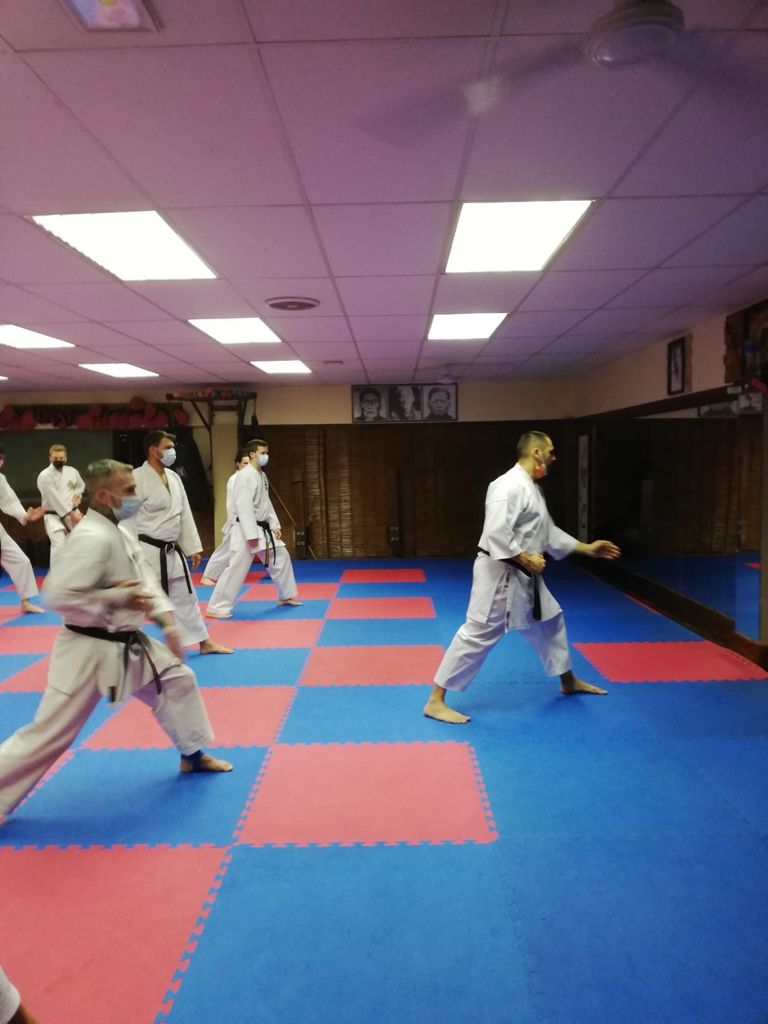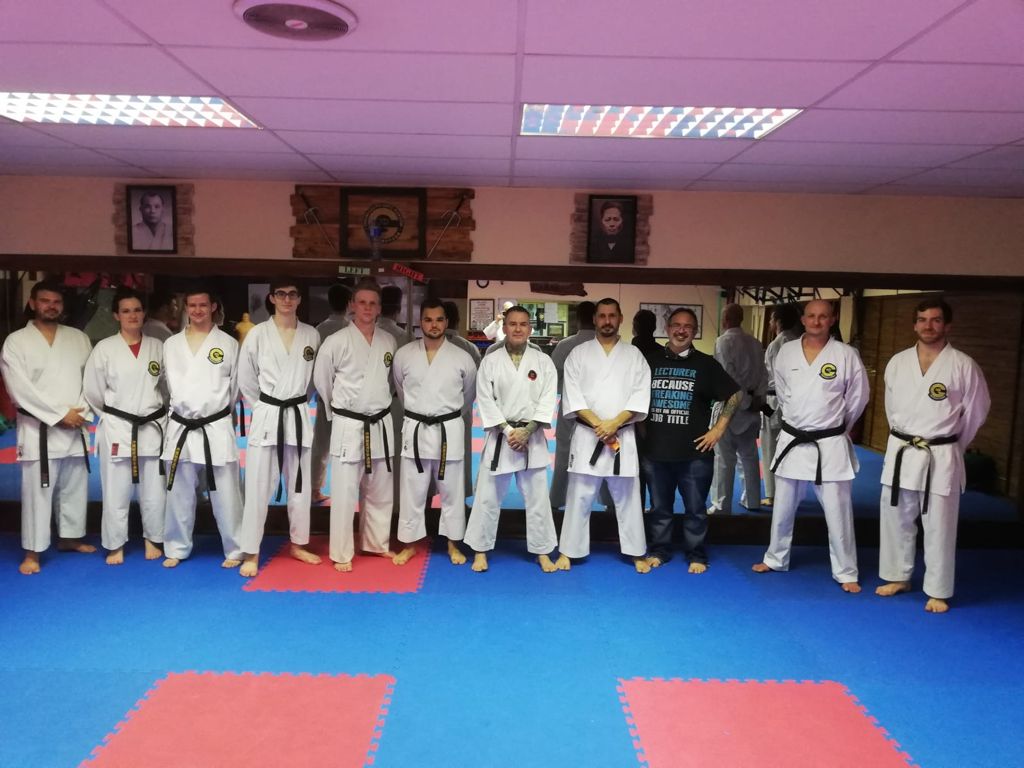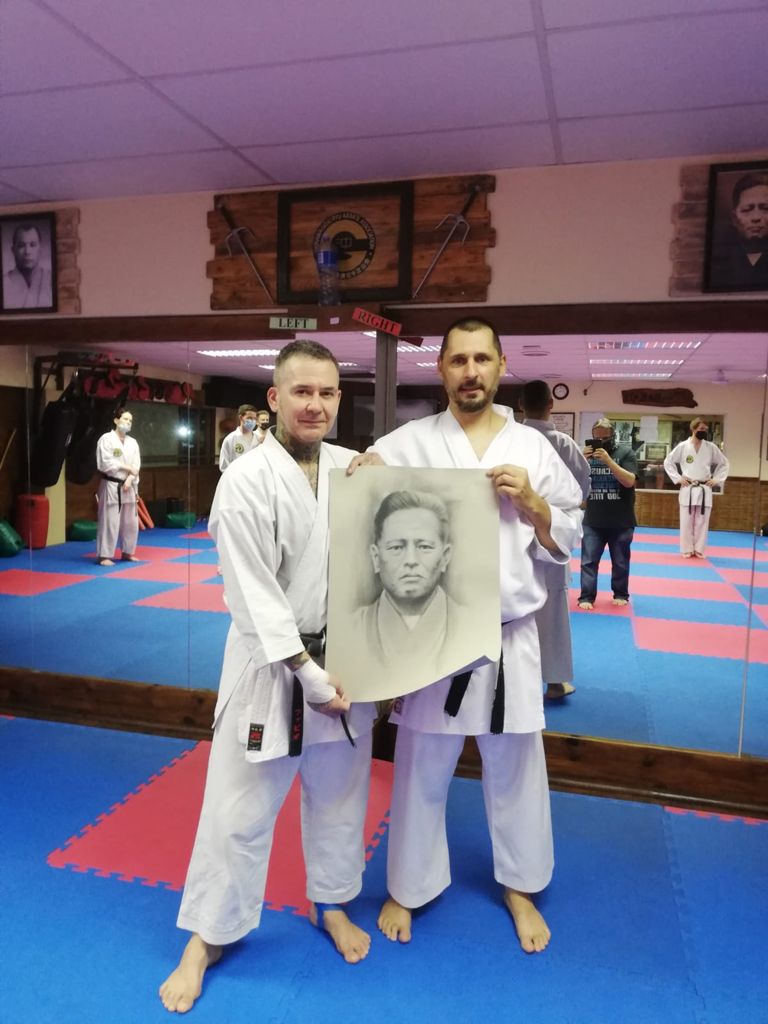Brief History
journey and friendship. Another student at the time was Che’ Jagger, who was younger than us and I remember him being joyful and energetic, as well as skillful.
By the time we were teenagers Mario had a two year break from karate due to health reasons. During this time I had begun to train in another dojo further west in Krugersdorp under Sensei Johan Roets. Eventually both Mario and I ended up grading to our black belts as teenagers under the late Sensei Teruo Chinen. I believe Che’ followed suit rather quickly.
Due to a motorcycle accident in 1989, my own training was halted, although I did return on the odd occasion. By the time I came to the England in 2000, my training had stopped altogether. In 2010 I trained for a while again, but returned full time at Cambridge Goju Ryu in 2014.
Throughout all this time Mario and Che’ never stopped training and Mario recently celebrated 40 years of karate. Sensei Mario (now Godan) has run his dojo at Palm Court Karate (Johannesburg) since 1992 as a full time Sensei with hundreds of students. Sensei Che’ (also Godan) runs his dojo (not far from Mario) at the Goju Ryu Karate Centre.
The Visit and the Training
Upon entering Palm Court Karate Centre for the first time on the Tuesday evening, I felt that it was exactly how I imagined it to be. Lots of history on the walls and the dojo well equipped. It spoke of Sensei Mario’s passion for karate and it had a welcoming calmness. Sensei Mario’s wife Zenobia recognised me and welcomed me straight away while he was teaching class. As soon as he noticed I had arrived, he came over and I couldn’t help thinking how that brown belt as a boy had
become quite an imposing figure. It was really nice moment and I felt our past reconnecting. After a brief chat he tended to his students once again and then finished the class. The class that followed was Nidan (2nd Dan) and above and since my Gi was already on, I thought it would have been rude not to join! Sensei gave me a warm welcome to the class. He
explained about our history and said that he was intrigued to see what differences there would be, or that have developed over the years because we no longer train under the same association. Over time some subtle differences become inevitable, especially within the kata. I did find these to be so slight and what was clear is that the essence of Goju Ryu remains intact no matter what. Sensei Mario also made an interesting point, saying that he can tell if somebody
trained karate as a child, or if they started later on in life - irrelevant of grade. In his view, a person’s karate has an “accent” if they start later on, whereas those who trained as children (and are now adults) don’t have an “accent” and that their karate looks similar (even though we have different physiques and statures).
The class focused on Kururunfa kata which we had been speaking about in our distant communications most recently. As expected there were some slight details that differed, but what was immediately apparent was Sensei Mario’s knowledge and understanding of the kata, which one can always learn from. I also noticed how he naturally commanded respect from his students, whilst at the same time wasn’t shy of little humour. One particular comment that made me chuckle whilst demonstrating was “why do you pick up all my bad habits and none of the good ones??” (with a rye smile on his face). The consensus seemed to be to train hard, but be human and kind too, a nice balance of Go (hard) and Ju (soft).
In class we focused on aspects of the kata in some ways that were new to me and then moved onto bunkai (practical self-defence applications of the kata). The fluidity and ease with which Sensei Mario demonstrated his bunkai reminded me of how he has dedicated 40 years of his life to karate. He then encouraged us to consider the concepts that he spoke of and formulate our own ideas based on these. I found this to be an interesting approach as it showed his confidence in who he was teaching. It also encouraged students to think “outside the box” and analyse what they are doing.
Catching up with Lifelong Friends
Two days later I returned to the dojo and we had quite a gruelling yet enjoyable Hojo Undo (supplementary training) class that was based around several of our katas. I was then due to meet both Sensei Mario and Sensei Che’ one morning for a small session and catch up, as well as see first hand the incredible dojo that Sensei Mario is building (which includes a traditional garden dojo with makiwaras in the African sun). Unfortunately, however, this didn’t materialise due to some unforeseen circumstances which forced me to change my plans at the last minute.
Besides the actual karate experience that I could bring back with me from the trip, what I also learned is that karate really does create lifelong friendships (paraphrasing Mario). I often refer to the people I train with in the UK (and on various gasshukus) as my karate family. It brings home that karate is not just about fitness or self-defence, but also about these friendships we make. Upon returning to the UK and teaching my own students, I couldn’t help but think that one day
some of them might be Senseis in their own right and that they might meet up again from afar and reflect upon their time now, as young students in the dojo. Well I hope that they will be as lucky as I feel I have been in this respect.
Sensei Fabio Giovannoni



 RSS Feed
RSS Feed